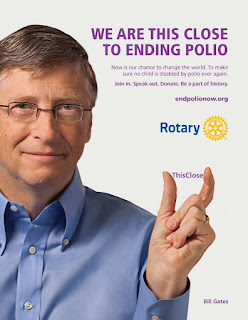If
you’re a certain age, born in mid-20th Century, you might have heard
of polio from your grandparents or maybe even know someone who suffered from
the crippling childhood disease.
If
you were born in this century, it’s likely you’ve never heard of it. Be grateful!
Poliomyelitis
(Polio) is a paralyzing and potentially fatal virus that plagued the 20th
Century and still threatens children under five in some parts of the
world. It disabled Franklin D. Roosevelt
and many other Americans of that era.
The good news is, polio is about to become the second
pandemic virus that has been eradicated from the face of the Earth. In 1947, Dr. Jonas Salk, a physician who
turned researcher and immunologist, developed a vaccine to prevent polio with
the help of the Foundation for Infantile Paralysis.
Salk, was hailed a hero in 1955 when news of the
vaccines’ success was made public. Salk deemed
it a “moral commitment” to immunize all children, and advocated an aggressive
immunization campaign in the U.S. and around the world. He refused to pursue personal profit and a
patent for his discovery, believing public health was a greater concern. When asked, he stated, “There is no patent…could
you patent the Sun?”
Generations from the 1960’s on, grew up with vaccinations,
and without the threat, or fear of polio.
Gone were leg braces, iron lungs, social embarrassment and isolation. The disease became a relic of another
era. In a brief time, polio was
eradicated in the United States thanks to Salk’s vaccine, aggressive
administration, and his generosity with the cure.
Polio has continued to be pandemic in the rest of the
world, especially in developing countries with little or no healthcare. The problem is not a cure, but distribution
and vaccination.
This is where Rotary comes into the picture.
In 1985 Rotary International launched its Polio Plus
program to rid the world of polio through mass vaccination of children. From that time forward, Rotarians have
traveled throughout the world sponsoring polio days and administering
vaccinations to children in some of the most remote places on Earth. It’s simply two drops on the tongue. The battle was just getting it there. In some
parts of the world, cease fires took place in Waring nations to allow citizens
to get immunized. Lines at some stations
stretched for miles and it was common for women to carry their children 10
miles or more just to get to a vaccination.
Today, polio exists in only three nations on Earth;
Afghanistan, Nigeria and Pakistan. Only
22 cases were confirmed worldwide in 2017, a reduction of 99.9 percent since
the 1980’s when the world saw more than 1,000 cases daily. The remaining cases are the most difficult to
prevent due to geographic isolation, poor pubic infrastructure, armed conflict
and cultural barriers. Until it is
completely eradicated, all nations are still at risk.
The Global Polio Eradication Initiative, formed in
1988, is a public-private partnership which includes Rotary, The World Health
Organization, U.S. Center for Disease Control, UNICEF, and the Bill and Melinda
Gates Foundation. Rotary’s focus is
advocacy, fundraising, volunteer recruitment, administration and
awareness. Rotary has also contributed
more than $1.8 billion raised by Rotarians in the 33,000 clubs worldwide. Rotary’s Advocacy efforts have played a role
in decisions by donor governments to contribute more than $7.2 billion to the eradication
effort.
Rotary has had an ongoing “This Close” campaign with a
growing roster of public figures helping to raise awareness, including Bill
Gates, John Cena, Jackie Chan, Queen Noor, Bishop Desmond Tutu and Jack
Nicklaus to name a few. These ambassadors
help educate the public about polio through public service announcements,
social media and public appearances.
Rotary plans to recognize World Polio Day on October
24 to raise awareness of the organization’s efforts and make the final push
towards total worldwide eradication.
Many Rotarians may have a “purple pinkie”, a purple fingernail which
might raise curiosity. The purple pinkie
campaign reflects the fact that once a child has been immunized, their pinkie is
dipped in purple ink as a way of marking their immunization.
 Rotary is counting down to History and hopes to end
this disease in the very near future. We
are “This Close” to that day!
Rotary is counting down to History and hopes to end
this disease in the very near future. We
are “This Close” to that day!
If you would like to contribute to Rotary’s Polio
Campaign, visit www.endpolio.org
or www.rotary.org
for more information.
T. R. Shaw Jr. is CEO of Shaw Communication in Battle
Creek, a past president of the Cereal City Sunrise Rotary Club, and a Paul
Harris Fellow. He is also Public Image
Chairman for Rotary’s District 6360 and is a contributor to Polio Plus.


